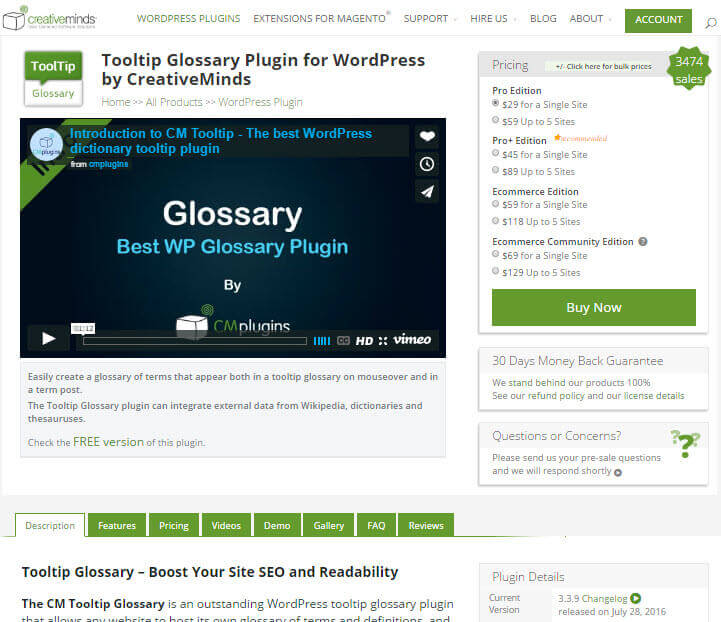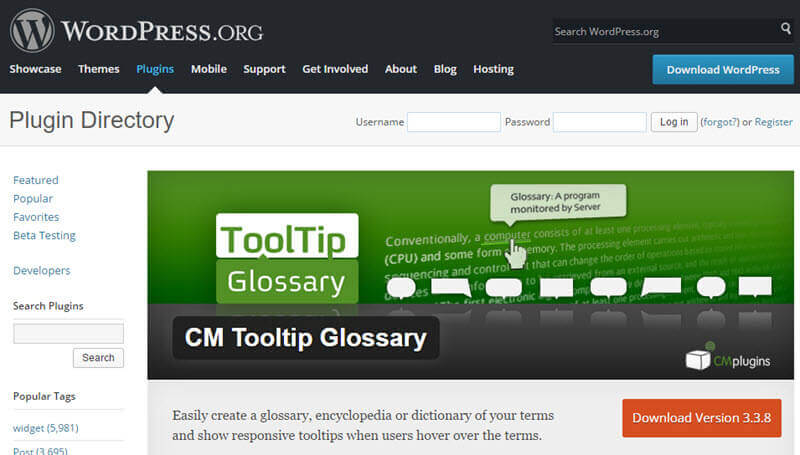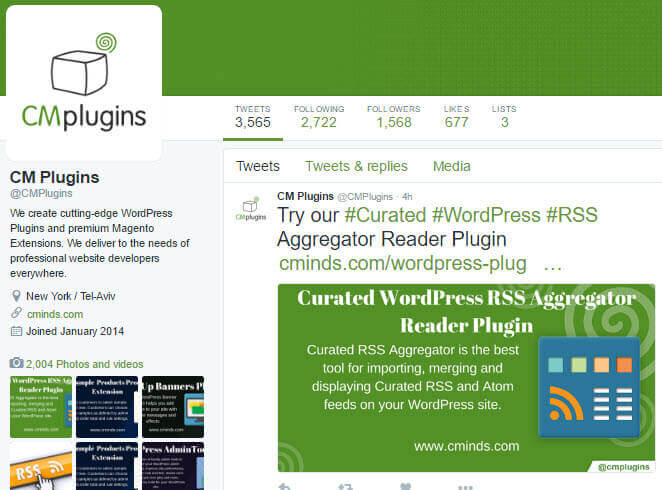So you developed a WordPress plugin you think is pretty handy. Maybe it is a novel solution to a problem WordPress users have. Now what?

We’ve already discussed the importance of a good plugin onboarding process in engaging WordPress users. If you want a plugin that succeeds in the market and draws sales, you’re going to have to invest some time, effort, and a bit of money into marketing.
The reason for focusing on plugin marketing is simple: even if you have the greatest plugin ever made, if people don’t know about it, you’re not going to sell to anyone. This is where marketing comes in.
To help developers, we’ve compiled the ultimate guide to plugin marketing. We’ll share what we’ve learned in marketing our CreativeMinds plugins and a list of tips and tricks for marketing a new plugin.
Stay tuned for a plugin marketing checklist at the end!
December 2024 Offer – For a Limited Time Only:
Get Essential Content Marketing Bundle for 20% off! Don’t miss out!
The First & Most Important Step: Create Marketable Plugins

Before you even think about marketing a plugin, you first need to ask some important questions about the product:
- Does the plugin solve a problem?
- Is the problem one that many WordPress users have?
- Is there a difference between your plugin and other plugins?
These questions get at fundamental point about plugin marketing: to succeed in marketing a plugin, you need to start with a good plugin. Good products market themselves and plugins are no different in this respect.
If your plugin isn’t novel, meaning it’s either a completely new concept or is somehow different from other plugins, it’s going to be harder to market.
Start by identifying what’s great about your plugin. What makes it exciting and useful? If you can’t think of anything, this is a sign you should probably add some new features.
The Basics: A Website and Product Information
The first step to marketing a premium plugin is to create a product page on your website. If this is your first plugin and you don’t have a website, make one!
The product page is where people will learn about the plugin and buy it. The larger website will give information on other plugins available and details about the plugin company like support, money-back guarantee, etc.

Tips for Creating Good Plugin Product Pages:
Creating a good plugin page takes a bit of effort. Here are some key pieces to creating a good plugin product page:
Plugin description-
Write a thorough, yet easy to read plugin description. Give customers all the information they need to know if the plugin is right for them, but don’t be redundant or wordy.
Include screenshots-
Take clear screenshot images of the front-end and back-end plugin features. Make sure to highlight the most important functions in the screenshots.
Support options-
Give details on the availability of support and how customers can ask pre-sale and post-sale questions.
Plugin documentation-
Link to detailed documentation on the product page so potential customers can explore details of the plugin and current customers can find self-service support.
Video-
Include a short video showing key features of the plugin and explaining what it does. (Read more on using video later in this post)
Demo-
If possible, link to a demo where WordPress users can see the plugin in action.
FAQ-
Display any questions you think people might have and pertinent questions you have received. Then answer them and display Q&A on an FAQ page.
Branding-
Make sure the plugin pages are branded with custom graphics and the plugin company logo.
List a Free Version on WordPress.org

WordPress has a built in marketing channel for plugin developers: it’s WordPress.org, the free plugin repository. This is a great place for any plugin developer to list their plugins.
The freemium plugin pricing model involves offering a free version of a plugin as well as a premium paid one. This pricing model is popular among developers, who choose to either list an add-on to a premium plugin or a simpler version of a premium plugin on WordPress.org. The thinking is that if customers try out a free version, they’ll be more likely to purchase the premium option.
Customers use the WordPress.org plugin repository to search for new plugins, compare options, and learn more about developers. Because it’s the starting point for a lot of WordPress users, listing plugins on WordPress.org can be an incredibly effective marketing technique.

Content is Key
Content marketing is another useful way to help sell plugins. This involves using various types of content to, you guessed it, market plugins. It’s affordable and incredibly effective when done right.
Blog Posts
Creating good blog content goes back to the first part of this article about determining the need a plugin addresses. Once you’ve determined why your plugin is so great, use blog content to highlight this.
Blog content for plugins can include plugin lists (include your own), illustrating novel features, and going through use cases. Here are a few example titles:
- Top X Plugins to do Y
- How to do Y with Plugin A
Case studies
Case studies give in-depth details on what a plugin can be used for and how well it works based on someone actually using the plugin. These are usually longer pieces of content that can be posted on a blog or offered as a PDF.
Do you have customers who rave about how they saw more e-commerce sales with your plugin? Turn their success into a case study highlighting how well the plugin works with a real-life scenario.
Video demos
CreativeMinds is a good example of using video to highlight plugin features and demonstrate how to use a plugin. Each CM plugin product page includes a video available on Vimeo and YouTube that shows potential plugin users the basics.
Seeing plugins in action through a video demo is an effective marketing tool because WordPress users can see firsthand why a plugin is so great instead of simply being told it’s great. By uploading videos to Vimeo or YouTube, plugin companies can also gain exposure directly through these platforms when using the right keywords.
Here are a few tips to making great video content to promote plugins:
- Keep it short (~2-3 minutes). Any longer and you risk boring potential customers.
- Highlight important and unique features of the plugin
- Use titles on video frames to help guide viewers through the video
Plugin Support
You might be thinking “Plugin support as a marketing tool? No way!”
Support is important for any successful WordPress plugin. It’s not only helpful after customers have purchased a plugin, it’s essential for selling plugins.
Bad support can ruin a plugin developer’s reputation. On the other hand, if a plugin company is known for providing good support, that is an incredibly powerful marketing tool. Make sure to promote this awesome support as part of the product customers receive.
Social Media

Pretty much everyone’s on social media these days. If your plugin company isn’t, it could be hurting business.
Promoting a plugin is all about letting people know how awesome it is. Social media channels like Twitter, Facebook, LinkedIn, and more are great ways to expose a wide audience to your products.
To get the most from social media, regularly post that superb content you created (above) and quick blurbs about your plugins highlighting what they do.
Social media posts with images generally get more attention, so make or find some simple images to go with your posts. In addition, make sure to use hashtags so people can find your posts.
Facebook Ads
Facebook has a built in advertising feature that can be useful when marketing new plugins. You can use Facebook Ads to pinpoint certain demographics based on age, location, interests, and more. You can also track how well these ads do. Note: this is a paid marketing option where you can choose how much you want to pay.
Groups on Social Media
Another social media marketing technique is to join groups on Facebook, Google+, and LinkedIn with members who are already interested in WordPress plugins or the general solution you’re offering. Many groups allow members to post their plugins. This can be a good way to get your plugins in front of a specific target audience instead of a general one.
Make sure the group allows plugin promotion posts before you try this!
SEO
Another important consideration when marketing a plugin is SEO. Investing time in SEO will help potential customers find your plugin through organic search.
Doing keyword research can help you find the proper keywords to use on the plugin product page, video description, and WordPress.org plugin listing.
Plugin Reviews, Guest Posting, & WordPress News Sites

Several WordPress-specific sites with high traffic will do plugin reviews of new plugins, write articles about new plugins, or accept guest posts about plugins. This can be a good way to expose your plugin to a large audience of WordPress lovers.
Plugin reviews are not always the most effective plugin marketing tool, as the review can either not turn out so well or the website can choose not to review the plugin. If your plugin does get a good review, though, this can really boost its popularity.
You can try offering a free copy of the premium plugin to WordPress bloggers (no matter how small the blog) in exchange for a review. This will increase number of people aware of the new plugin.
Here’s a list of WordPress news websites that accept plugins for review or write about new plugins:
Some will review plugins for a price. Look for specific guidelines about plugin reviews. If you don’t see any, it doesn’t hurt to contact.
Some of these WordPress websites will also accept guest posts about your plugin. Write a clear piece about what makes your plugin special and useful and submit it to one (or several) of these sites. If a site picks it up, you’re potentially on your way to increased plugin sales.
Affiliate Marketing
An affiliate program is another option for plugin marketing. This basically means affiliates receive money for referring new customers to the plugin. Affiliates might write about your plugin or share it on social media.
Extend the offer to become an affiliate to customers who have already purchased the product. These customers are already familiar with the plugin and may be willing to promote it.
CreativeMinds Affiliate Program
Get Creative: Post in Comments, Reddit, Quora, & More
Plugin marketing can sometimes involve getting creative in where you promote a plugin. Here are some non-traditional methods of promoting your WordPress plugin:
Blog Comments
If you come across a blog post related to what your plugin does, take the opportunity to comment on the post with a link to your product and why it solves a certain problem. For example, if a blog post is about how to create an FAQ page and you have an awesome FAQ plugin, post a link in the comments with a short blurb about why people should check it out.
Use Google Alerts to keep track of articles related to the plugin so you won’t have to worrying about missing opportunities.
Quora
Quora is a question-and-answer site where questions are asked and answered by a large community of users. Frequently, users post questions about WordPress plugins.
You can use Quora to promote your plugin product pages and blog content as answers to related questions.
Another potentially advantageous plugin marketing avenue is Reddit. There are multiple subreddits related to WordPress, including r/WordPress and r/WordPressplugins. Check them out and post blog content Reddit users will find useful and at the same time, promotes your plugins.
Plugin Marketing Checklist

We’ve mentioned a lot of different ways to market and promote WordPress plugins. To summarize, here’s a checklist of steps to take when promoting a new or existing WordPress plugin:
- Make sure the plugin solves a problem and is unique
- Add a free version or free plugin add-on to WordPress.org
- Create a plugin product page on a dedicated developer website
- Post plugin on Twitter, Facebook, LinkedIn and Google+
- Create blog content highlighting the plugin and its features
- Create video demos showing how to use the plugin
- Offer reputable support as a marketable feature
- Make sure all content has the correct keywords for the plugin
- Reach out to WordPress-specific sites and ask them to post about the plugin
- Start an affiliate marketing program
- Get creative and post the plugin to related content and platforms
With these plugin marketing steps, you’re on the way to turning a good plugin into a plugin people purchase and encourage others to purchase.



